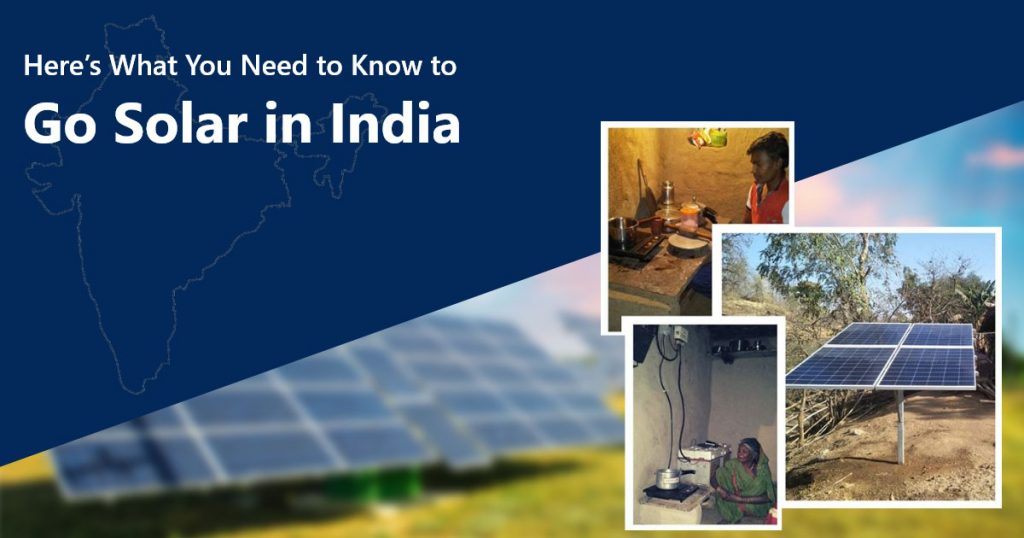Here’s What You Need to Know to Go Solar in India.

India, with a population of over 1 billion people and a rapidly rising economy, is experiencing massive energy demand. In terms of power production and consumption, the country is ranked fifth in the globe. Electricity production has increased over time, but we cannot ignore the fact that the country’s population has grown as well. The majority of the country’s power is generated from coal (53 percent), and the country’s coal supplies are expected to run out by 2040-50.
Solar energy is the best kind of energy for meeting India’s growing energy demands and bridging the energy demand-supply gap.
Why is Solar Energy Viable For India
Be it due to nature’s abundance or our geographical location, India averages 300 days of clear weather every year. Every year, we get roughly 5000 kilowatt hours of sunshine. The fact that this power is greater than the energy output of fossil fuels for a year explains its strength.
India has emerged as a hotspot for solar sales. Solar Panel Installations in India are popular, yet many people are ignorant of their full potential.
Here are all the things you must know before opting solar in India:
Know your Roof
Any installation of solar panels or a solar energy system must meet the following requirements:
- Available Sunlight;
- Enough rooftop space; and
- A strong and well inclined rooftop
solar panels collect energy from the Sun, ensure that your rooftop receives enough sunlight and is not shaded before proceeding with a solar panel installation. If you do have a shaded rooftop, though, you must ensure that it is properly maintained. The Benefits of solar power are likewise large and cumbersome. As a result, a sturdy roof top is required to prevent the structure from collapsing..
Also Read – The Benefits of Rooftop Solar Power in India.
Understand Your Usage
Before you go all out with Solar Panel Installation in India, keep in mind that solar panels are not functional at night. Though research on capturing visible light is ongoing, for the time being, solar panels are the only option. If you are fully reliant on solar energy, you will need to plan on restricting your electrical usage to get you through the night.
A solar cell in India produces an average of 0.5 volts. Because a solar panel typically has 36 or 72 cells, you’ll need to calculate your electricity use. Consider if you need the solar panel to power the entire house or just a few specific demands, such as the water heater, while estimating.
Learn about your warranties
On average, a solar power system lasts roughly 25 years. These panels, on the other hand, require regular maintenance. They are exposed to the assaults of wind and dust because they are exposed to sunlight. Any impediment or obstacle, such as a layer of dust, could obstruct or ruin the panel’s ability to receive sunlight.
As a result, understanding the warranty durations for solar goods is critical. The normal guarantee granted by the market on solar modules is roughly 10 years, though it varies depending on the product. Typically, the performance warranty is for 25 years.
Know The Price Along With The Long Term Benefits
In India, the cost of installing a solar power system can range from INR 40,000 to INR 6 lac. Solar systems, which appear to be inexpensive at first glance, can help you save money on your electricity costs in the long run.
There are a few additional factors to consider if you want to understand why India is pushing for solar energy installation and use. Get in touch with Top solar companies in India, and start benefiting from this renewable source of energy.
Also Read – How Much Do Solar Panels Save on Electricity Bills in India.
Check for Subsidy in your state
The government is making a concerted effort to entice citizens to invest in solar energy. As a result, when you put a solar system on your roof, the federal and state governments cover a portion of the cost.
Homeowners, on the other hand, can only get a subsidy from the state DISCOM if they install solar panels from a solar developer. As a result, double-check that the developer you choose has been approved by the state utility company (DISCOM). This information is available on the DISCOM website.
Check for the maintenance packages
Solar panels require regular maintenance to be functioning and in good working order. Before the installation begins, make sure you ask your solar developer about these maintenance requirements and also get your hands on Solar Batteries.
Your solar plant may not last for its whole lifetime if you are unable to meet those maintenance needs on your own. Even warranties will not be able to compensate for your lack of upkeep.
Final Thoughts –
You’ll be ahead of the curve if you go solar. Plus, there’s nothing quite like harnessing solar energy to power your entire home, right?
Choosing whether or not to install solar panels at home is similar to making your first house purchase. It will take some study and consideration, but the rewards will be evident. Today is the day to go solar and see how it can improve your life. You must look for “Solar Panels Installers Near Me” and find top installers near you.